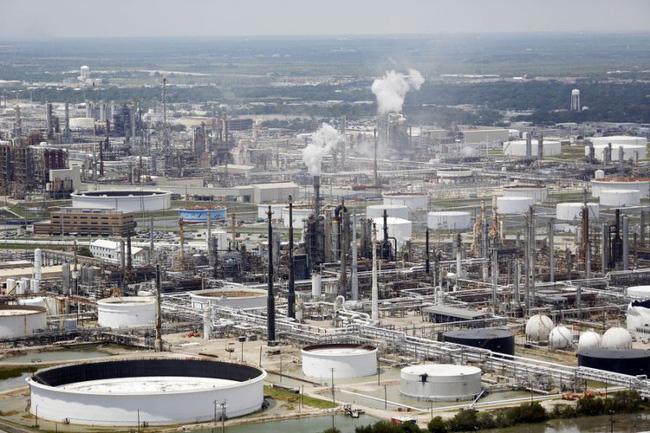Hurricane Harvey makes the world’s most important chemical a rare commodity
14:24 - 19/01/2021
Ethical shortages after Hurvey Harvey made the US chemical industry “dizzy”
Very few Americans are interested in ethylene (Ethylene). Even so, many people have never heard of this substance.
Ethylene is a colorless and flammable gas. This is considered to be the most important petrochemical on earth. Ethylene is one of the major causes of damage in the chemical industry caused by Hurricane Harvey spreading across the US manufacturing industry.

“Ethylene is an important petrochemical that affects the entire industry,” said Chirag Kothari, an analyst with Nexant. Ethylene is the backbone of plastic production – an important raw material for Consumer goods and industry in the United States.
According to PetroChemWire, in the wake of Hurricane Harvey, most US ethylene plants are forced to shut down, which translates into a loss of 61 percent of their ethylene production capacity.
In nature, ethylene is produced during ripening. However, according to Kothari, the gas also plays a key role in the global chemical industry worth $ 3.5 trillion, up from 145 million tonnes last year.
The plants use ethylene to produce polyethylene, the most common plastic in the world and also the main raw material for garbage bags and food packaging. In the production of ethylene glycol, ethylene acts as an antifreeze, which helps the engine and the wing to not freeze in winter. Ethylene is also used to make polyester applications in textiles and in the manufacture of water bottles.
Ethylene is the raw material for the production of vinyl products such as PVC water pipes, medical devices and shoe soles. This gas is also used in the production of polystyrene foam insulation and lightweight and energy-saving plastic parts of automobiles, contributing to global warming. In addition, ethylene is also used to make synthetic rubber in tires, which increases the safety of traffic. Ethylene is also used in paint and gum.
According to Hassan Ahmed, an expert at Alembic Global Advisors, ethylene and ethylene derivatives account for 40% of the global consumption of chemicals. Before Hurricane Harvey, ethylene production plants in the world were operating at full capacity to meet the growing demand in the market.
Last Thursday, Ahmed shared any incidents that would seriously affect the supply-demand balance, and it was clear that Hurley was not the only one.
Although Gulf Coast chemical plants have been designed to withstand the effects of wind and storms, Harvey is astonishing. Coastal Texas-based ethylene companies devastated by Harvey include LyondellBasell Industries NV in Corpus Christi, ExxonMobil in Baytown, and Chevron Phillips Chemical Company in Port Arthur, Louisiana.
Damage on the market
According to Kevin McCarthy, a stock analyst at Vertical Research Partners, Hurvey’s hurricane-bound time and direction combined with the total amount of rainfall in the storm has caused unprecedented levels of damage. Manufacturers in the chemical industry in the United States. “We have not seen anything like it during 18 years working with chemicals stocks on Wall Street.”
The sudden shortage of ethylene and other raw materials is making the supply chain “miserable”. More than half of the nation’s polyethylene production capacity has been halted over the past week. More than 60% of polypropylene production – another resin, is also lost.
According to Ahmed, units buying chemicals and plastics continue to operate but there are no additional stockpiles in stock. Many manufacturers have informed consumers that they can not complete enough supplies as specified in the contract because of the storm.
Commitments not completed
Just before Harvey’s arrival, Formosa Plastics shut down its ethylene and plastic plants in Texas. On Aug. 30, the company announced it could not fulfill its commitment to supply polyethylene, polypropylene and PVC.
Due to the shortage of chemical products in the region, the demand for natural gas decreased sharply. Manufacturers such as Dow Chemical Company use gas as a raw material for ethylene production and provide power for large furnaces and other equipment. According to Citigroup, gas demand has fallen more than 1.5 billion cubic meters per day, or nearly 8% of the total consumption in the same period last year.
Demand for other key raw materials for ethylene production, such as ethanol and butane, has also fallen by about 90 percent as plants shut down, according to PetroChemWire.
It may take several weeks for the production situation to recover before Harvey occurs because of the complexity of ethylene production, according to a report released by IHS Markit on Thursday. In addition, plants should thoroughly evaluate the damage before returning to work.
Suddenly back
According to Ahmed, companies are unlikely to know for sure how much damage the plant will have when it comes back. And maybe, when it comes back to work, new plants have discovered that some important equipment has been damaged by floodwaters. “No one can handle the whole damage now,” Ahmed said.
Even if the bulk of the chemical industry can recover in the next few weeks, logistics challenges may still hamper supply.





